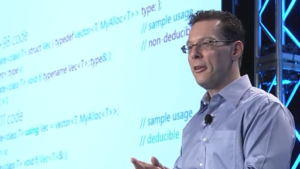C++17 in details: language clarifications -- Bartlomiej Filipek
C++17 will make a few things more predictable and clarifies some of the usage.
C++17 in details: language clarifications
by Bartlomiej Filipek
From the article:
C++ specification is now clearer. We have now ways to assume Copy Ellison will happen, some orders of operations are well defined now, operator new is now aware of the alignment of a type and also exceptions are part of the function declaration.

 Have you registered for CppCon 2017 in September?
Have you registered for CppCon 2017 in September?  Have you registered for CppCon 2017 in September?
Have you registered for CppCon 2017 in September?  ACCU’s Overload journal of June 2017 is out. It contains the following C++ related articles.
ACCU’s Overload journal of June 2017 is out. It contains the following C++ related articles. CppCon 2017 just announced its keynote and plenary speakers:
CppCon 2017 just announced its keynote and plenary speakers:
 Herb is the convener (chair) of the ISO C++ standards committee.
Herb is the convener (chair) of the ISO C++ standards committee.
 Matt’s
Matt’s  Have you registered for CppCon 2017 in September?
Have you registered for CppCon 2017 in September?